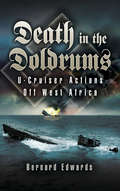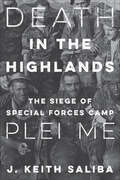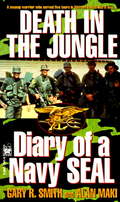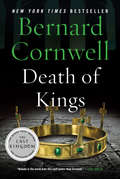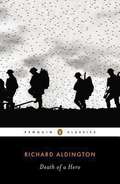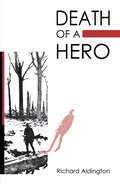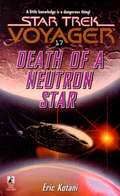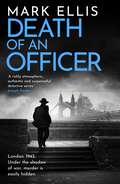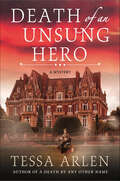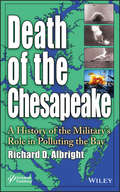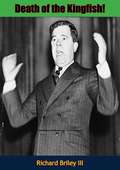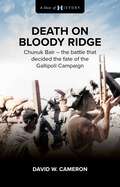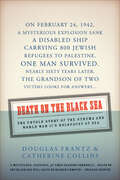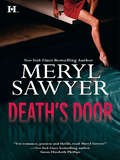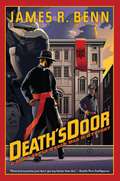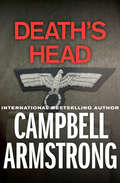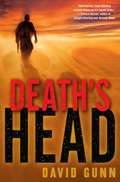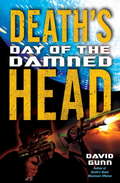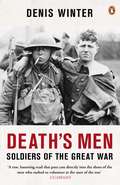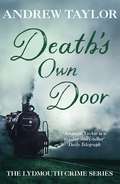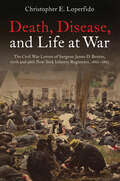- Table View
- List View
Death in the Doldrums: U-Cruiser Actions off West Africa
by Bernard EdwardsWith their very long range, the giant Type IX U-Cruisers gave Admiral Dnitz's U-boat fleet global reach. Initially these boats operated with considerable success off the East coast of America and in the Caribbean but their main impact was in the Gulf of Guinea 1942-43 which, due to the closure of the Suez Canal, was a vital Allied supply route. Two submarines in particular (U-68 and U-505) had a profound effect causing major panic by their hugely successful operations.
Death in the Highlands: The Siege of Special Forces Camp Plei Me
by J. Keith SalibaA history of the first engagement between the U.S. Army and the North Vietnamese Army at the beginning of the Vietnam War in 1965. In fall 1965, North Vietnam&’s high command smelled blood in the water. The South Vietnamese republic was on the verge of collapse, and Hanoi resolved to crush it once and for all. The communists set their sights on South Vietnam&’s strategically vital West-Central Highlands. Annihilate ARVN&’s defenses in Kontum and Pleiku provinces, the communists surmised, and the region&’s remaining provinces would topple like dominoes. Their first target was the American Special Forces camp at Plei Me, remote and isolated along the Cambodian border. As darkness fell on 19 October, 1965, two North Vietnamese Army regiments—some four thousand troops— crept into their final strike positions. The plan was as simple as it was audacious: one regiment would bring the frontier fortress under murderous siege while the other would lie in wait to destroy the inevitable rescue force. Initially, all that stood athwart Hanoi&’s grand scheme was a handful of American Green Berets, a few hundred Montagnard allies—and burgeoning U.S. airpower. Cut off and beleaguered, Plei Me&’s defenders fought for their lives, while a daring band of close air support and resupply pilots helped keep the beast at bay. But as the overland relief force bogged down, 5th Group ordered in the legendary &“Chargin&” Charlie Beckwith and his elite Project Delta to help hold the line. Soon, the 1st Cavalry Division would also join the fray, setting the stage for its bloody Ia Drang Valley fights a few weeks later. Before it was over, the siege of Plei Me would push its defenders to the brink and usher in the first major clashes between the U.S. and North Vietnamese armies. Drawing on archival research and interviews with combat veterans, J. Keith Saliba reconstructs this pivotal battle in vivid, gut-wrenching detail and illustrates where the siege fit in the war&’s strategic picture. Praise for Death in the HighlandsWinner, 2021 Gold Medal in history, Military Writers Society of America&“This story has it all: the bravery and suffering of men in extreme peril and how they lived and died. Plei Me was the prelude to the bloody battles of the 1st Cavalry Division troopers in the nearby Ia Drang Valley just weeks later. Keith Saliba has done them all proud.&” —Joseph L. Galloway, co-author of the New York Times bestseller We Were Soldiers Once . . . and Young&“Military history at its best . . . a clear, detailed, and highly readable account of an important but little understood battle of the Vietnam War.&” —Col. Andrew R. Finlayson, USMC (Ret.), author of Killer Kane: A Marine Long-Range Recon Team Leader in Vietnam, 1967–1968 and winner of the CIA&’s Studies in Intelligence Award
Death in the Jungle
by Alan Maki Gary SmithSNAKES, VIPERS, CROCS, SHARKS, AND THE VCWith 257 combat missions in Vietnam under his belt, Gary Smith is a living witness to the realities of Naval Special Warfare. He worked with some of the toughest and most highly motivated men in the world, executing missions in the murderous terrain of Rung Sat Special Zone and Dung Island. The key to their success: go where no ordinary soldier would go and no VC would expect them.Though death reigned as king in the jungles of Vietnam, Gary Smith considered it a privilege and an honor to serve under the officers and with the men of Underwater Demolition Team Twelve and SEAL Team 1. Because he and his teammates, trained to the max, gave each other the courage to attain the unattainable . . . .From the Paperback edition.
Death is in the Air
by Kate KingsburyMeet Elizabeth Hartleigh Compton. She’s the house-rich, money-poor keeper of the Manor—and keeper of the peace. In WWII England, the quiet village of Sitting Marsh is faced with food rations and fear for loved ones. But Elizabeth Hartleigh Compton, lady of the Manor House, stubbornly insists that life must go on. Sitting Marsh residents depend on Elizabeth to make sure things go smoothly. Which means everything from sorting out gossip to solving the occasional murder. “Dangerous Enemy on the Loose!” read the newspaper headlines. When a German pilot crash-lands and escapes into the nearby woods, locals are in a panic. But Lady Elizabeth caught a good glimpse of the fellow as he parachuted down, and he seemed nothing more than a harmless, terrified young boy. Until a local girl is found murdered the very day he disappears. Coincidence? The constable thinks not. But Elizabeth suspects everyone’s jumping to conclusions. And once again, she’s in the thick of a murderous muddle, combing for clues and searching for answers before more trouble ignites.
Death of Kings: A Novel (Saxon Tales #6)
by Bernard CornwellThe sixth installment of Bernard Cornwell’s New York Times bestselling series chronicling the epic saga of the making of England, “like Game of Thrones, but real” (The Observer, London)—the basis for The Last Kingdom, the hit television series.As the ninth century wanes, Alfred the Great lies dying, his lifelong goal of a unified England in peril, his kingdom on the brink of chaos. Though his son, Edward, has been named his successor, there are other Saxon claimants to the throne—as well as ambitious pagan Vikings to the north.Torn between his vows to Alfred and the desire to reclaim his long-lost ancestral lands in the north, Uhtred, Saxon-born and Viking-raised, remains the king’s warrior but has sworn no oath to the crown prince. Now he must make a momentous decision that will forever transform his life and the course of history: to take up arms—and Alfred’s mantle—or lay down his sword and let his liege’s dream of a unified kingdom die along with him.
Death of a Hero
by Richard Aldington James H. MeredithOne of the great World War I antiwar novels--honest, chilling, and brilliantly satirical Based on the author's experiences on the Western Front, Richard Aldington's first novel, Death of a Hero, finally joins the ranks of Penguin Classics. Our hero is George Winterbourne, who enlists in the British Expeditionary Army during the Great War and gets sent to France. After a rash of casualties leads to his promotion through the ranks, he grows increasingly cynical about the war and disillusioned by the hypocrisies of British society. Aldington's writing about Britain's ignorance of the tribulations of its soldiers is among the most biting ever published. Death of a Hero vividly evokes the morally degrading nature of combat as it rushes toward its astounding finish.
Death of a Hero
by Richard Aldington"Death of a Hero", published in 1929 was the author’s literary response to the war. He went on to publish several works of fiction. In 1942, having moved to the United States, he began to write biographies. This last work was very controversial, as it was highly critical of the man still regarded as a war hero.
Death of a Neutron Star: Star Trek Voyager (Star Trek: Voyager #17)
by Eric KotaniAn alien scientist asks to join Captain Kathryn Janeway and her crew in the investigation of an unprecedented scientific find. Soon U.S.S. Voyager® is embroiled in a battle of wills among several alien races -- each intent on manipulating the discovery toward its own end and decimating whole worlds in the process. Janeway must stop a quest for knowledge from turning into a plot for destruction!
Death of an Officer
by Mark Ellis'Tightly plotted, meticulously researched, and written with wonderful panache. Death of an Officer is an excellent entry in a truly remarkable historical mystery series' TOM MEADLondon. Spring 1943. While Europe continues to suffer under the iron fist of Nazi occupation, Britain remains battered but unbowed.DCI Frank Merlin, already contending with a booming wartime crime wave in the capital, is confronted with a baffling case: the brutal murder of a respected doctor. Following a puzzling trail that leads him into the hidden corners of clubland - and which appears to be linked to the disappearance of both British and American officers - Merlin must untangle a dark web of shocking secrets.Praise for Mark Ellis:'This is to my shame the first Mark Ellis book I've read. If the others evoke a vanished London so impressively, are graced with such complex plots and deep characterisation, and, above all, are written so well I shall have to read them all.' THE TIMES'Masterly . . . compelling . . . one of the most attractive characters to emerge in recent detective-thriller fiction' ANDREW ROBERTS, SUNDAY TIMES BESTSELLING AUTHOR'Against the backdrop of Blitz-hit London, this stylish thriller sees Scotland Yard's Frank Merlin investigate a tangled conspiracy' SUNDAY MIRROR 'An atmospheric, compelling evocation of war-torn London in the wake of the Blitz, where DCI Frank Merlin fights against a tidal wave of crime' GEOFFREY WANSELL, Crime and Thriller Reviewer, DAILY MAIL'Unputdownable' ROBERT LYMAN'Mark Ellis delivers diamonds - an intriguing, masterly juggling of an intricate plot and an enviable command of detail.' JOHN LAWTON'Extraordinarily atmospheric and compelling, DEAD IN THE WATER is a wonderfully intelligent and complex story' CHRIS LLOYD, HWA Gold Crown Award winner.'...historical noir at its best. Mark Ellis's talents as a writer are many; finely embroidered plotting, a meticulously researched historical context and place, and rounded characters whose lives and capers become real for a reader' GARY DONNELLY'A very satisfying puzzle, expertly crafted' HISTORICAL NOVEL SOCIETY
Death of an Officer
by Mark Ellis'Tightly plotted, meticulously researched, and written with wonderful panache. Death of an Officer is an excellent entry in a truly remarkable historical mystery series' TOM MEADLondon. Spring 1943. While Europe continues to suffer under the iron fist of Nazi occupation, Britain remains battered but unbowed.DCI Frank Merlin, already contending with a booming wartime crime wave in the capital, is confronted with a baffling case: the brutal murder of a respected doctor. Following a puzzling trail that leads him into the hidden corners of clubland - and which appears to be linked to the disappearance of both British and American officers - Merlin must untangle a dark web of shocking secrets.Praise for Mark Ellis:'This is to my shame the first Mark Ellis book I've read. If the others evoke a vanished London so impressively, are graced with such complex plots and deep characterisation, and, above all, are written so well I shall have to read them all.' THE TIMES'Masterly . . . compelling . . . one of the most attractive characters to emerge in recent detective-thriller fiction' ANDREW ROBERTS, SUNDAY TIMES BESTSELLING AUTHOR'Against the backdrop of Blitz-hit London, this stylish thriller sees Scotland Yard's Frank Merlin investigate a tangled conspiracy' SUNDAY MIRROR 'An atmospheric, compelling evocation of war-torn London in the wake of the Blitz, where DCI Frank Merlin fights against a tidal wave of crime' GEOFFREY WANSELL, Crime and Thriller Reviewer, DAILY MAIL'Unputdownable' ROBERT LYMAN'Mark Ellis delivers diamonds - an intriguing, masterly juggling of an intricate plot and an enviable command of detail.' JOHN LAWTON'Extraordinarily atmospheric and compelling, DEAD IN THE WATER is a wonderfully intelligent and complex story' CHRIS LLOYD, HWA Gold Crown Award winner.'...historical noir at its best. Mark Ellis's talents as a writer are many; finely embroidered plotting, a meticulously researched historical context and place, and rounded characters whose lives and capers become real for a reader' GARY DONNELLY'A very satisfying puzzle, expertly crafted' HISTORICAL NOVEL SOCIETY
Death of an Unsung Hero: A Mystery (Lady Montfort Mystery Series #4)
by Tessa ArlenAn English country house becomes a WWI hospital—and one of its patients falls victim to a mysterious enemy—in this “winning historical mystery” (Booklist).In 1916 and the world is at war. Lady Montfort has persuaded her husband to offer his family’s dower house to the War Office as an auxiliary hospital for officers recovering from shell-shock. Along with the estate, their redoubtable housekeeper Mrs. Jackson will join the war effort as the hospital’s quartermaster.Despite the hospital’s success, the farming community of Haversham does not approve of a country-house hospital for men they consider cowards. When one of the patients, Captain Sir Evelyn Bray, is found lying face down in the vegetable garden with his head bashed in, Lady Montfort and Mrs. Jackson fear that the hospital will be closed. Once again the two women unite to discover who would have reason to murder a war hero suffering from amnesia.“The surprising solution will reward careful readers. The way Arlen integrates the traumas of WWI into a golden age whodunit plot will please Charles Todd fans.” —Publishers Weekly
Death of the Chesapeake: A History of the Military's Role in Polluting the Bay
by Richard AlbrightIn essence this book deals with an area that contributes significantly to the pollution and degradation of Chesapeake Bay, but has been completely overlooked in many of the efforts to restore the Bay, specifically, the federal military pollution sources. The book also recognizes for the first time, that efforts to restore the Bay have failed because of violation of a fundamental precept of environmental cleanup; that is, to sample the site and see what is there. The Bay itself has never been sampled. Thus this book presents a view of the environmental condition of Chesapeake Bay that is totally unique. It covers a part of the history of the Bay that is not widely known, including how the Bay was formed. It presents a mixture of science, military history, and novel solutions to the Bay's degradation. In so doing, the author examines the military use of the Bay and reveals the extent of munitions dumpsites containing nitrogen and phosphorus as well as chemical warfare material, and how this is effecting the environment. The book concludes with the author's own clean-up plan that, if implemented, would go a long way to restoring health to Bay. The book is supplemented with many photographs and maps.
Death of the Kingfish!: Who Did Kill Huey Long?
by Richard Briley IIIFirst published in 1960, this book by former newspaperman, author and Louisianan native, Richard Briley III, deals with the untimely demise of Huey Long, aka “The Kingfish,” an American politician who served as the 40th governor of Louisiana (1928-1932) and as a member of the U.S. Senate from 1932 until his death by assassination in 1935.A Democrat, “The Kingfish” was an outspoken populist who denounced the wealthy and the banks and called for a “Share Our Wealth” program. As the political leader of the state, he commanded wide networks of supporters and was willing to take forceful action. He established the long-term political prominence of the Long family.Long’s Share Our Wealth plan was established in 1934 under the motto “Every Man a King.” It proposed new wealth redistribution measures in the form of a net asset tax on corporations and individuals to curb the poverty and homelessness endemic nationwide during the Great Depression. To stimulate the economy, Long advocated federal spending on public works, schools and colleges, and old age pensions. He was an ardent critic of the policies of the Federal Reserve System.Under Long’s leadership, hospitals and educational institutions were expanded, a system of charity hospitals was set up that provided health care for the poor, massive highway construction and free bridges brought an end to rural isolation, and free textbooks were provided for schoolchildren. He remains a controversial figure in Louisiana history, with critics and supporters debating whether or not he could have potentially become a dictator or was a demagogue.
Death on Bloody Ridge: Chunuk Bair - the battle that decided the fate of the Gallipoli Campaign
by David W. CameronThe August Offensive or &‘Anzac Breakout&’ at Gallipoli was an attempt to break the stalemate of the campaign. It saw some of the bloodiest fighting since the landing as Commonwealth and Turkish troops fought desperate battles at Lone Pine, German Officers&’ Trench, Turkish Quinn&’s, The Chessboard, The Nek, The Farm, Hill Q, Chunuk Bair, and Hill 971. The offensive was designed to allow the allied forces to &‘break out&’ of the Anzac beachhead below the Sari Bair Range. The capture of Chunuk Bair by the New Zealanders resulted in some of the bloodiest fighting at Gallipoli and was key to the entire August offensive. While it was taken and held for a few days - it&’s recapture by the Turks on 10 August 1915 decided the fate of the Gallipoli Campaign. Within four months the Allies were forced to evacuate the peninsula, leaving it to the Turks - a decisive victory for the Ottoman Empire Death on Bloody Ridge: Chunuk Bair - the battle that decided the fate of the Gallipoli Campaign, focuses solely on this one decisive battle.
Death on a Deadline (A Homefront News Mystery #2)
by Joyce St. AnthonyEditor-in-chief Irene Ingram pencils in her newest mystery in Joyce St. Anthony&’s second captivating Homefront News mystery, perfect for fans of Anne Perry and Rhys Bowen.As World War II rages in Europe and the Pacific, the small town of Progress is doing its part for the soldiers in the field with a war bond drive at the annual county fair. Town gossip Ava Dempsey rumors that Clark Gable will be among the participating stars. Instead of Gable, the headliner is Freddie Harrison, a B-movie star. When Freddie turns up dead in the dunk tank, Irene Ingram, editor-in-chief of The Progress Herald, starts chasing the real headline. There are plenty of suspects and little evidence. Ava&’s sister Angel, who was married to the dead actor, is the most obvious. The couple had argued about his affair with the young starlet Belinda Fox, and Angel was the last person to see Freddie alive. Irene discovers there&’s more than one person who might have wanted Freddie dead. As Irene draws on her well-honed reporter&’s instincts to find the killer—nothing is what it seems in Progress, and now her own deadline could be right around the corner.
Death on the Black Sea: The Untold Story of the 'Struma' and World War II's Holocaust at Sea
by Douglas Frantz Catherine CollinsOn the morning of February 24, 1942, on the Black Sea near Istanbul, an explosion ripped through a decrepit former cattle barge filled with Jewish refugees. One man clung fiercely to a piece of deck, fighting to survive. Nearly eight hundred others -- among them, more than one hundred children -- perished.In Death on the Black Sea, the story of the Struma, its passengers, and the events that led to its destruction are investigated and fully revealed in two vivid, parallel accounts, set six decades apart. One chronicles the international diplomatic maneuvers and callousness that resulted in the largest maritime loss of civilian life during World War II. The other recounts a recent attempt to locate the Struma at the bottom of the Black Sea, an effort initiated and pursued by the grandson of two of the victims. A vivid reconstruction of a grim exodus aboard a doomed ship, Death on the Black Sea illuminates a forgotten episode of World War II and pays tribute to the heroes, past and present, who keep its memory alive.
Death's Door
by Meryl SawyerRomantic suspense from a New York Times bestseller with “bold pacing and a steamy love affair . . . keeps readers guessing right up to the tingling conclusion” (Booklist).Madison Connelly is tired of lies—and betrayal. First her husband and business partner leaves her for another woman. Then Detective Paul Tanner arrives to tell her that the man she thought was her father isn’t. Madison wants answers . . . answers about her past that someone is going to deadly lengths to keep hidden.Falling for Madison isn’t in Paul’s job description. And soon she’ll need more than Paul’s growing attraction to keep her safe. Because she’s about to be drawn deep into a complicated web of intrigue, deceit—and murder.
Death's Door (Billy Boyle World War II Mystery #7)
by James R. BennIn this seventh installment of James R. Benn's hit WWII-era mystery series, Lieutenant Billy Boyle goes undercover in the Vatican. Lieutenant Billy Boyle could have used a rest after his last case, but when his girlfriend, Diana Seaton, a British spy, goes missing in the Vatican, where she was working undercover, he insists on being assigned to a murder investigation there so he can try to help her. An American monsignor is found murdered at the foot of Death's Door, one of the five entrances to Saint Peter's Basilica. Wild Bill Donovan, head of the OSS, wants the killing investigated. The fact that the Vatican is neutral territory in German-occupied Rome is only one of the obstacles Billy must overcome. First is a harrowing journey, smuggled into Rome while avoiding the Gestapo and Allied bombs. Then he must navigate Vatican politics and personalities--some are pro-Allied, others pro-Nazi, and the rest steadfastly neutral--to learn the truth about the murdered monsignor. But that's not his only concern; just a short walk from the Vatican border is the infamous Regina Coeli prison, where Diana is being held. Can he dare a rescue, or will a failed attempt alert the Germans to his mission and risk an open violation of Vatican neutrality?
Death's Head
by Campbell ArmstrongA cat-and-mouse game between a disguised SS surgeon and the Jewish man who knows his secrets plays out in postwar Berlin in international bestselling author Campbell Armstrong's riveting suspense novel Occupied Berlin is a bombed-out city where a desperate man can easily hide or assume a new identity. SS surgeon Gerhardt Schwarzenbach wastes no time in becoming Dr. Gerhardt Lutzke, safely burying the crimes he committed in a Nazi concentration camp. Then one day he finds himself staring into a face from the past: that of the Jew Leonhard Grunwald. Thus begins a deadly chase between Schwarzenbach, who must kill to sever the last tie to his past, and Grunwald, who is haunted by secrets of his own.
Death's Head
by David GunnSet in a chillingly realistic far-future world, and featuring a gritty antihero even more frightening than the evil empire he serves as soldier and assassin, Death’s Head is sure to be one of the most talked-about novels of the year. David Gunn is loaded–and he shoots to kill. At the top of the galactic pecking order is the United Free, a civilization of awe-inspiring technological prowess so far in advance of other space-faring powers as to seem untouchable gods. Most of the known universe has fallen under their inscrutable sway. The rest is squabbled over by two empires: one ruled with an iron fist by OctoV, a tyrant who appears to his followers as a teenage boy but is in reality something very different, the other administered by the Uplifted, bizarre machinelike intelligences, and their no-longer-quite-human servants, cyborgs known as the Enlightened. Sven Tveskoeg, an ex-sergeant demoted for insubordination and sentenced to death, is a vicious killer with a stubborn streak of loyalty. Sven possesses a fierce if untutored intelligence and a genetic makeup that is 98.2 percent human and 1.8 percent . . . something else. Perhaps that “something else” explains how quickly he heals from even the worst injuries or how he can communicate telepathically with the ferox, fearsome alien savages whose natural fighting abilities regularly outperform the advanced technology of their human enemies. Perhaps it is these unique abilities that bring Sven to the attention of OctoV. Drafted into the Death’s Head, the elite enforcers of OctoV’s imperial will, Sven is given a new lease on life. Armed with a SIG diabolo–an intelligent gun–and an illegal symbiont called a kyp, Sven is sent to a faraway planet, the latest battleground between the Uplifted and OctoV. There he finds himself in the midst of a military disaster, one that will take all his courage–and all his firepower–to survive. But an even deadlier struggle is taking place, a struggle that will draw the attention of the United Free. Sven knows he is a pawn, and pawns have a bad habit of being sacrificed. But Sven is nobody’s sacrifice. And even a pawn can checkmate a king.
Death's Head: Day of the Damned
by David GunnFueled with high-octane testosterone and noteworthy for a kill rate more customary in computer games than in works of literature, David Gunn’s novels take no prisoners and make no apologies. Like war itself, they are raw and violent, horrifying yet mysteriously moving. These qualities also characterize Gunn’s hero and narrator, Lt. Sven Tveskoeg, a killing machine whose DNA marks him as less–or perhaps more–than human. Whatever he is, he is always as enthralling as he is lethal. Sven has survived everything a hostile universe can throw at him. But he’d be the first to admit that it isn’t smarts that have kept him alive for so long. And it’s not luck, either. Because luck wouldn’t have seen him plucked out of obscurity to serve in the army of Emperor OctoV, a machine-human hybrid who appears to be a teenage boy but is actually immeasurably older. Maybe Sven has survived out of sheer orneriness–although his artificially intelligent, unmistakably sarcastic, and more or less sociopathic sidearm might argue otherwise–but Sven isn’t one to ponder such questions. In Day of the Damned, Sven and his band of misfit auxiliaries have arrived at Farlight, capital of the Octavian Empire, for a little well-earned rest and relaxation. Sven visits his old friends Debro and Anton, whom he liberated from the prison planet of Paradise, and their teenage daughter Aptitude, whose husband he assassinated and who now has a major crush on him. But what begins as a respite quickly turns into a bloodbath as civil war erupts. And behind the double crosses and Byzantine betrayals threatening to topple OctoV from the throne he has held for thousands of years are the United Free, a galaxy-spanning empire with the technology of gods and the morals of schoolchildren. As usual, big trouble seems to be following Sven. Which is all right with him. He isn’t that fond of vacations, anyway.
Death's Men: Soldiers Of The Great War
by Denis WinterDeath's Men is the classic bestselling story of the First World War as told by the soldiers themselves - reissued for the 2014 Centenary.Millions of British men were involved in the Great War of 1914-1918. But, both during and after the war, the individual voices of the soldiers were lost in the collective picture. Men drew arrows on maps and talked of battles and campaigns, but what it felt like to be in the front line or in a base hospital they did not know. Civilians did not ask and soldiers did not write.Death's Men portrays the humble men who were called on to face the appalling fears and discomforts of the fighting zone. It shows the reality of the First World War through the voices of the men who fought.'A raw, haunting read that puts you directly into the shoes of the men who rushed to volunteer at the start of the war' Guardian'An engrossing view of what it was like to live in the trenches, go on leave, get wounded, et cetera, and features voice after voice from the ranks' TelegraphDenis Winter was born in 1940 and read history at Pembroke College, Cambridge. Death's Men was first published in 1978, to critical and popular acclaim. This was followed by his book The First of the Few: Fighter Pilots of the First World War.
Death's Own Door: The Lydmouth Crime Series Book 6
by Andrew Taylor'Andrew Taylor is a master story-teller' Daily Telegraph From the No.1 bestselling author of The Ashes of London and The Fire Court, this is the sixth instalment in the acclaimed Lydmouth seriesWhen the body of Rufus Moorcroft, a middle-aged widower with a distinguished war record, is found in his summerhouse, the verdict is suicide. But both reporter Jill Francis and her lover, Detective Richard Thornhill, approaching the case from different angles, discover there's more to it than that. The key to the mystery stretches back to a highly-charged summer before the war, and back to another death. A local asylum plays a part, as do a moderately famous artist and his wife; Superintendent Williamson, now retired and loathing it; Councillor Bernie Broadbent - a man with more pies than fingers to put in them; a Cambridge don; an aristocratic unmarried mother, now gleefully drawing her old-age pension; and - to Thornhill's surprise and growing horror - his own wife, Edith.'An excellent writer. He plots with care and intelligence and the solution to the mystery is satisfyingly chilling' The Times'The most under-rated crime writer in Britain today' Val McDermid 'There is no denying Taylor's talent, his prose exudes a quality uncommon among his contemporaries' Time Out
Death's Own Door: The Lydmouth Crime Series Book 6
by Andrew Taylor'Andrew Taylor is a master story-teller' Daily Telegraph From the No.1 bestselling author of The Ashes of London and The Fire Court, this is the sixth instalment in the acclaimed Lydmouth seriesWhen the body of Rufus Moorcroft, a middle-aged widower with a distinguished war record, is found in his summerhouse, the verdict is suicide. But both reporter Jill Francis and her lover, Detective Richard Thornhill, approaching the case from different angles, discover there's more to it than that. The key to the mystery stretches back to a highly-charged summer before the war, and back to another death. A local asylum plays a part, as do a moderately famous artist and his wife; Superintendent Williamson, now retired and loathing it; Councillor Bernie Broadbent - a man with more pies than fingers to put in them; a Cambridge don; an aristocratic unmarried mother, now gleefully drawing her old-age pension; and - to Thornhill's surprise and growing horror - his own wife, Edith.'An excellent writer. He plots with care and intelligence and the solution to the mystery is satisfyingly chilling' The Times'The most under-rated crime writer in Britain today' Val McDermid 'There is no denying Taylor's talent, his prose exudes a quality uncommon among his contemporaries' Time Out
Death, Disease, and Life at War: The Civil War Letters of Surgeon James D. Benton, 111th and 98th New York Infantry Regiments, 1862–1865
by Christopher LoperfidoA collection of letters from a Union surgeon in the American Civil War, revealing what life was like for a doctor and a soldier in that era.Union surgeon James Dana Benton witnessed firsthand the suffering and death brought about by the ghastly wounds, infections, and diseases that wreaked havoc to both the Union and Confederate armies. A native of New York, Dr. Benton penned a series of letters throughout the war to his family relating his experiences with the 111th New York Infantry as an assistant surgeon, and later with the 98th New York as surgeon. This unique correspondence—which covers a wide array of topics beyond medicine and the treatment of the injured—is the basis of Death, Disease, and Life at War: The Civil War Letters of Surgeon James D. Benton, 111th and 98th New York Infantry Regiments, 1862-1865.Dr. Benton was present for some of the war’s most gruesome and important battles, including Gettysburg, Cold Harbor, and the siege of Petersburg. He was also present for the fall of Harpers Ferry, Abraham Lincoln’s second Inaugural address, and the collapse of Richmond. His pen offers an insightful and honest look into the everyday life of not only a Union surgeon, but also an officer who suffered the same basic hardships other soldiers in the ranks endured. Chris Loperfido’s Death, Disease, and Life at War is a valuable addition to the Civil War bookshelf.“More than 600,00 men perished in the Civil War, and many more were wounded or fell ill. Prompt and timely attention from an army surgeon was often the difference between life and death. James Benton’s letters home provide a compelling glimpse into the everyday life of these doctors—their concerns and frustrations, their patients and colleagues, the places visited, and their opinions on the war. I commend Christopher Loperfido for bringing this interesting slice of the war to light.” —Scott L. Mingus, Sr., award-winning author of Confederate General William “Extra Billy Smith”: From Virginia’s Statehouse to Gettysburg Scapegoat“Loperfido’s excellent arrangement of [Benton’s] letters provide[s] a compelling look at the life of a Union doctor during a time when the practice of medicine was still primitive and an understanding of health in general was scanty at best. Death, Disease, and Life at War is another valuable piece to the puzzle of understanding what it was like to serve in the Civil War.” —Meg Groeling, author of The Aftermath of the Battle: The Burial of the Civil War Dead
